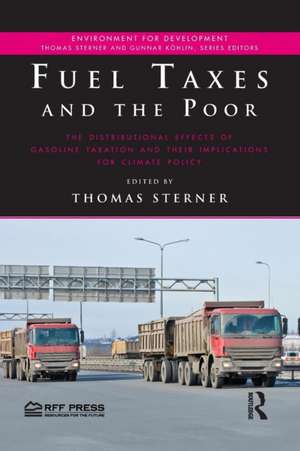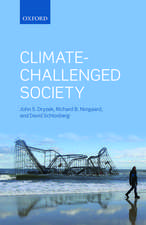Fuel Taxes and the Poor: The Distributional Effects of Gasoline Taxation and Their Implications for Climate Policy: Environment for Development
Editat de Thomas Sterneren Limba Engleză Paperback – 16 oct 2015
| Toate formatele și edițiile | Preț | Express |
|---|---|---|
| Paperback (1) | 486.10 lei 6-8 săpt. | |
| Taylor & Francis – 16 oct 2015 | 486.10 lei 6-8 săpt. | |
| Hardback (1) | 954.83 lei 6-8 săpt. | |
| Taylor & Francis – 8 dec 2011 | 954.83 lei 6-8 săpt. |
Preț: 486.10 lei
Nou
Puncte Express: 729
Preț estimativ în valută:
93.03€ • 96.76$ • 76.80£
93.03€ • 96.76$ • 76.80£
Carte tipărită la comandă
Livrare economică 14-28 aprilie
Preluare comenzi: 021 569.72.76
Specificații
ISBN-13: 9781138184237
ISBN-10: 1138184233
Pagini: 402
Dimensiuni: 156 x 234 x 20 mm
Greutate: 0.54 kg
Ediția:1
Editura: Taylor & Francis
Colecția RFF Press
Seria Environment for Development
Locul publicării:Oxford, United Kingdom
ISBN-10: 1138184233
Pagini: 402
Dimensiuni: 156 x 234 x 20 mm
Greutate: 0.54 kg
Ediția:1
Editura: Taylor & Francis
Colecția RFF Press
Seria Environment for Development
Locul publicării:Oxford, United Kingdom
Cuprins
1. Introduction 2. The Consumer Burden of a Carbon Tax on Gasoline 3. Distributional and Efficiency Impacts of Increased U.S. Gasoline Taxes 4. Estimates from a Consumer Demand System: Implications for the Incidence of Environmental Taxes 5. Fuel Tax Incidence in Costa Rica: Gasoline versus Diesel 6. The Income Distribution effects of Fuel Taxation in Mexico 7. Is Fuel Taxation Progressive or Regressive in China? 8. Are Fuel Taxes in India Regressive? 9. Is Reducing Subsidies on Vehicle Fuel Equitable? A Lesson from Indonesian Reform Experience 10. Distributional Consequences of Transport Fuel Taxes in Ethiopia 11. Political Petrol Pricing: the Distributional Impact of Ghana's Fuel Subsidies 12. Distributional Effects of Transport Fuel Taxes in Kenya: Case of Nairobi 13. Assessing the Impact of Oil Price Changes on Income Distribution in Mali: An Input-Output Approach 14. An Analysis of the Efficacy of Fuel Taxation for Pollution Control in South Africa 15. Fuel Taxation and Income Distribution in Tanzania 16. Distributional Effects in Europe 17. Who pays taxes on fuels and public transport services in the Czech Republic? Ex post and ex ante measurement 18. Distributional Effect of Reducing Transport Fuel Subsidies in Iran 19. Conclusions
Notă biografică
Thomas Sterner is a Professor of Environmental Economics at the University of Gothenburg in Sweden and a University Fellow of Resources for the Future, Washington DC. He has published a dozen books and more than 60 journal articles.
Recenzii
"Sterner’s book makes a strong case that arguments of fuel-tax regressivity are flawed: in most countries, fuel is a luxurious good, consumed largely by the rich... Though Sterner’s meta-analysis shows that tax progressivity decreases with a country’s median income, the book demonstrates that, in richer countries, the general regressivity of the tax can be alleviated through revenue recycling or tax swapping. This compilation makes it more difficult to argue against fuel taxes; policymakers should take note." - Elisheba Spiller, Bulletin of Indonesian Economic Studies
















